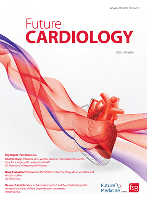
Future Cardiology
Scope & Guideline
Transforming insights into breakthroughs in cardiology.
Introduction
Aims and Scopes
- Cardiovascular Innovations and Techniques:
Focus on new technologies and procedures in cardiovascular interventions, including device innovations, surgical techniques, and minimally invasive approaches. - Pharmacological Advances in Cardiology:
Research on drug therapies, including novel pharmaceuticals and their applications in treating various cardiovascular conditions, with an emphasis on their efficacy and safety. - Patient-Centric Approaches:
Studies addressing the importance of patient engagement, shared decision-making, and individualized treatment plans in managing cardiovascular diseases. - Epidemiology and Public Health in Cardiology:
Exploration of cardiovascular disease prevalence, risk factors, and outcomes in diverse populations, highlighting the importance of preventive cardiology. - Integration of Technology in Cardiology:
Investigations into the use of telemedicine, artificial intelligence, and digital health technologies in the diagnosis and management of cardiovascular diseases. - Interdisciplinary Research:
Collaboration across different specialties to address complex cardiovascular issues, including the interplay between cardiology and other fields such as oncology and endocrinology.
Trending and Emerging
- Heart Failure Management:
A significant increase in studies related to heart failure, particularly focusing on innovative therapies, drug treatments, and personalized care strategies. - Impact of Comorbidities on Cardiovascular Health:
Heightened interest in understanding how comorbid conditions, such as diabetes and cancer, affect cardiovascular outcomes and treatment strategies. - Artificial Intelligence and Machine Learning:
Emerging applications of AI and machine learning in diagnostics, risk assessment, and treatment optimization are increasingly featured in recent research. - Longitudinal Studies and Real-World Evidence:
A growing trend towards conducting longitudinal studies and utilizing real-world data to assess treatment effectiveness and outcomes over time. - Cardio-Oncology:
The intersection of cardiology and oncology is becoming a prominent theme, with research focusing on managing cardiovascular complications in cancer patients. - Patient Quality of Life and Outcomes:
Increasing emphasis on the assessment of patient-reported outcomes and quality of life measures in cardiovascular research, reflecting a holistic approach to patient care.
Declining or Waning
- Traditional Surgical Techniques:
While surgical interventions remain crucial, there is a noticeable decline in publications focusing solely on conventional surgical approaches, as newer minimally invasive and transcatheter techniques gain popularity. - Single-Factor Risk Assessments:
Research focusing on isolated cardiovascular risk factors is becoming less common, as there is a shift towards understanding multifactorial influences on cardiovascular health. - Generalized Cardiovascular Guidelines:
There is a decreasing emphasis on broad, one-size-fits-all guidelines, with a growing focus on personalized medicine tailored to individual patient profiles. - Basic Science Research:
The journal has seen a reduction in purely basic science studies, as the focus shifts more towards translational and clinical research that directly impacts patient care. - Invasive Diagnostic Procedures:
As non-invasive imaging and diagnostic techniques improve, traditional invasive procedures for cardiovascular assessment are being reported less frequently.
Similar Journals

Research in Cardiovascular Medicine
Empowering research to transform cardiovascular care.Research in Cardiovascular Medicine is a renowned open-access journal published by Wolters Kluwer Medknow Publications, dedicated to advancing knowledge in the swiftly evolving field of cardiovascular health. With an ISSN of 2251-9572 and E-ISSN of 2251-9580, this journal serves as a vital platform for researchers and professionals to share their findings, explore innovative treatments, and discuss current trends in cardiovascular care. Since transitioning to open access in 2013, it has democratized access to high-quality research, ensuring that vital information reaches healthcare practitioners and academia alike. The journal’s commitment to rigorous peer review and its emphasis on cutting-edge research contribute significantly to improving patient outcomes and addressing the global burden of cardiovascular diseases. By publishing original articles, review papers, and clinical studies, Research in Cardiovascular Medicine plays a crucial role in shaping the future of cardiovascular research and education, appealing to a wide audience of researchers, professionals, and students striving to make meaningful contributions to this critical field.
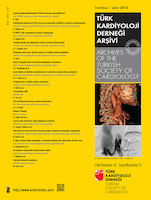
Turk Kardiyoloji Dernegi Arsivi-Archives of the Turkish Society of Cardiology
Fostering innovation in cardiology research and practice.Turk Kardiyoloji Dernegi Arsivi-Archives of the Turkish Society of Cardiology is a prominent peer-reviewed journal dedicated to advancing the field of cardiology and cardiovascular medicine. Published by KARE PUBL, this journal has established itself as a key resource for researchers, healthcare professionals, and students since its inception in 1990. As an Open Access journal since 2017, it ensures that cutting-edge research and clinical findings are readily accessible to a global audience, thus fostering collaboration and knowledge sharing among the cardiology community. With its recent rank in the Q3 quartile for Cardiology and Cardiovascular Medicine in 2023, and a Scopus rank of #282 out of 387, the journal is positioned to enhance its influence in the cardiovascular field, offering valuable insights and promoting evidence-based practices. The journal covers a wide range of topics within cardiology and cardiovascular research, making it an essential platform for scholars aiming to contribute to the ongoing dialogue in this vital area of medicine. For those eager to stay updated with the latest research trends and clinical practices in cardiology, Turk Kardiyoloji Dernegi Arsivi represents a crucial resource.
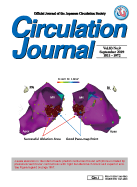
CIRCULATION JOURNAL
Leading the Charge in Cardiovascular Science and Care.CIRCULATION JOURNAL, published by the Japanese Circulation Society, stands as a premier platform for cutting-edge research in the fields of Cardiology and Cardiovascular Medicine. With an impressive impact factor placing it in the Q1 quartile for both cardiology and general medicine, this journal is essential for researchers and practitioners seeking to stay at the forefront of cardiovascular science. The journal's accessible open access options ensure that groundbreaking studies are widely disseminated, reflecting its commitment to advancing medical knowledge and improving patient care. Since its inception in 1996, CIRCULATION JOURNAL has fostered a global dialogue on vital cardiovascular issues, making it a vital resource for academics, healthcare professionals, and students alike. With its base in Tokyo, Japan, the journal not only highlights regional advancements but also contributes significantly to the global medical community.

Netherlands Heart Journal
Fostering Innovation in Heart Health Through Scholarly DiscourseNetherlands Heart Journal is a premier academic publication dedicated to advancing knowledge in the field of cardiology and cardiovascular medicine. Published by BOHN STAFLEU VAN LOGHUM BV, this journal has established itself as a critical platform for researchers, professionals, and students seeking to explore groundbreaking findings and innovative practices in cardiovascular health. With an ISSN of 1568-5888 and E-ISSN 1876-6250, the journal boasts a respectable Q2 ranking in the Cardiology and Cardiovascular Medicine category, placing it in the top half of its field according to the 2023 quartiles. The Scopus ranking places it 130th out of 387 in the relevant category, indicating a commendable percentile rank of 66th, which attests to its influence and quality of published research. Spanning from 2005 to 2024, the journal endeavors to include a diverse array of topics, encompassing clinical practice, technological innovations, and public health considerations related to cardiovascular diseases. Researchers and practitioners are encouraged to engage with the journal's robust content, contributing to and benefiting from the collaborative effort to enhance cardiovascular health worldwide.

Kardiologie
Advancing Cardiovascular Knowledge for a Healthier Tomorrow.Kardiologie is an emerging journal dedicated to advancing the field of cardiology and cardiovascular medicine, published by SPRINGER HEIDELBERG in Germany. Established with the first issue in 2022, this journal provides a valuable platform for the dissemination of innovative research, clinical studies, and review articles that contribute to both theoretical knowledge and practical applications in cardiology. While the journal currently holds a Q4 category ranking in the field and occupies a percentile of 24 according to Scopus, it aims to enhance its impact factor by attracting high-quality submissions from researchers and clinicians alike. Kardiologie is particularly focused on bridging the gap between cutting-edge research and clinical practice, ensuring that the latest scientific findings are readily accessible to practitioners. Though it operates under traditional access options at present, the journal aspires to broaden its accessibility and reach in future editions, making it a pertinent choice for anyone interested in the evolving landscape of cardiovascular health.

JOURNAL OF INVASIVE CARDIOLOGY
Empowering Cardiology Through Rigorous ScholarshipJOURNAL OF INVASIVE CARDIOLOGY, a reputable publication by H M P COMMUNICATIONS, is dedicated to advancing the field of cardiology and cardiovascular medicine through rigorous research and scholarly discussion. With an ISSN of 1042-3931 and an E-ISSN of 1557-2501, this journal serves as a crucial resource for healthcare professionals, researchers, and students who seek to stay informed about the latest findings and innovations in invasive cardiology. Having achieved a 2023 Scopus rank of #185 out of 636 in General Medicine, placing it in the 70th percentile, the journal is recognized for its significant contributions to medical science, evidenced by its Q2 ranking in Radiology, Nuclear Medicine and Imaging, and Q3 status in both Cardiology and Cardiovascular Medicine. The journal has been in circulation since 1990 and continues to foster a platform for critical research in the United States, ensuring accessibility to vital information necessary for enhancing patient care and clinical practices within the domain of invasive procedures.
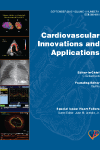
Cardiovascular Innovations and Applications
Exploring cutting-edge research to transform cardiovascular care.Cardiovascular Innovations and Applications is a premier open-access journal dedicated to advancing knowledge in the field of cardiovascular medicine. Published by COMPUSCRIPT since 2016, this journal provides a platform for the dissemination of innovative research and applications that address crucial topics in cardiology, aiming to bridge the gap between clinical practice and cutting-edge research. With an ISSN of 2009-8618 and an E-ISSN of 2009-8782, it operates on a global scale, facilitating access to high-quality content without financial barriers. The journal is positioned within the Medicine - Cardiology and Cardiovascular Medicine category, and its current Scopus rank of #321/387 reflects its potential for growth and influence in the academic community, being in the 17th percentile. Researchers, healthcare professionals, and students will find Cardiovascular Innovations and Applications an invaluable resource in their quest for the latest findings and advancements in cardiovascular health and treatment methodologies.

CJC Open
Elevating insights in cardiology and cardiovascular medicine.CJC Open is a leading open access journal published by Elsevier, focused on advancing the fields of Cardiology and Cardiovascular Medicine. Since its inception in 2019, the journal has committed to disseminating high-quality research and groundbreaking advancements in cardiovascular health. With its ISSN 2589-790X and an impressive Q2 ranking in its field, CJC Open aims to foster collaboration and communication among researchers, healthcare professionals, and students by providing a platform for innovative studies, reviews, and insights. The journal is indexed in Scopus, currently ranking at #191 out of 387 in its category, underscoring its relevance and impact in the academic community. As an open access journal, CJC Open ensures that research findings are widely available, promoting greater visibility and readership. Scientists and practitioners alike are encouraged to submit their work, further enriching the discourse in cardiovascular research. With a focus on quality and accessibility, CJC Open is poised to make significant contributions to the field through 2024 and beyond.

REVISTA ESPANOLA DE CARDIOLOGIA
Transforming Cardiovascular Research into Real-World ImpactREVISTA ESPANOLA DE CARDIOLOGIA is a premier journal dedicated to the dynamic field of cardiology, published by EDICIONES DOYMA S A in Barcelona, Spain. With an impressive Q1 status in the Medicine (miscellaneous) category for 2023, this journal is recognized for its significant contributions to cardiovascular research, evidenced by its rank of #61 out of 387 in the Scopus database, placing it within the top 16% of journals in its field. Covering a broad range of topics within cardiology, the journal aims to disseminate high-quality research, clinical studies, and educational content, fostering knowledge sharing among researchers, clinicians, and students alike. While it does not currently offer open access, the journal maintains a commitment to advancing cardiovascular health through rigorous peer-reviewed articles. With a publication history that spans from 2013 to 2024, REVISTA ESPANOLA DE CARDIOLOGIA is an essential resource for those seeking to stay at the forefront of cardiology advancements and practices.
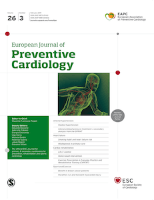
European Journal of Preventive Cardiology
Leading the charge in preventive cardiology insights.The European Journal of Preventive Cardiology, published by Oxford University Press, is a leading international journal dedicated to the field of cardiology and cardiovascular medicine. With an impact factor that underscores its prestige—ranking in the top quartile (Q1) of both cardiology and epidemiology categories—the journal serves as a critical resource for researchers and practitioners seeking to advance their understanding of preventive strategies in cardiovascular health. Since its inception in 1999, it has provided a platform for high-quality research and reviews that address the epidemiology of cardiovascular diseases, risk factor management, and innovative prevention methodologies. Notably, it currently ranks #21 out of 387 in Medicine - Cardiology and #13 out of 148 in Medicine - Epidemiology according to Scopus, highlighting its influential position in these essential biomedical fields. The journal also provides open access options, allowing both readers and authors the opportunity to engage with groundbreaking research and enhance the dissemination of knowledge. With a commitment to excellence, the European Journal of Preventive Cardiology is an invaluable asset for those dedicated to the prevention of cardiovascular diseases.